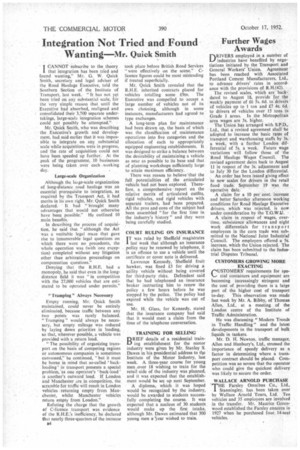Integration Not Tried and Found Wanting Mr. Quick Smith
Page 38

If you've noticed an error in this article please click here to report it so we can fix it.
• j CANNOT subscribe to the theory that integration has been tried and found wanting," Mr. G. W. Quick Smith, secretary and legal adviser of the Road Haulage Executive, told the Southern Section of the Institute of Transport, last week. "It has not yet been tried on any substantial scale, for the very simple reason that until the Executive had absorbed, realigned and consolidated their 3,700 separate undertakings, large-scak integration schemes could not possibly be attempted."
Mr Quick Smith, who was describing the Executive's growth and development, had said earlier that it was impossible to integrate on any substantial scale while acquisitions were in progress. and the rate of acquisition could not have been speeded up further. At the peak of the programme, 10 businesses were being taken over each working day.
Large-scale Organization
Although the laige-scale organization of long-distance road haulage was an essential prerequisite to integration, as required by the Transport Act, it had merits in its own right, Mr. Quick Smith declared. It had "brought many advantages that would not otherwise have been possible." He outlined 10 main benefits.
In describing the process of acquisition, be said that "although the Act was a veritable legal maze that gave rise to innumerable legal questions on which there were no precedents, the whole operation was (with one exception) completed without any litigation other than arbitration proceedings on compensation questions."
Denying that the R.H.E. had a monopoly, he said that even in the longdistance field it was "in competition with the 27,000 vehicles that are estimated to be operated under permits."
Tramping" Always Necessary Empty running, Mr. Quick Smith maintained, could never be entirely eliminated, because traffic between any two points was rarely balanced. "Tramping" would always be necessary, but empty mileage was reduced • by laying down priorities in loading, so that, wherever possible, a vehicle was provided with a return load.
"The possibility of organizing transport on the basis of competing regions or autonomous companies is sometimes canvassed," he continued, "but it must be borne in mind that so-called backloading' in transport presents a special problem, as one operator's ' back-load ' is another's outward load. If London and 'Manchester are in competition, the scramble for traffic will result in London vehicles returning empty from Manchester, whilst Manchester vehicles return empty from London."
Refuting the charge that the growth of C-licence transport was evidence of the R.H.E.'s inefficiency, he declared that nearly three-quarters of the increase
B4 took place before British Road Services were effectively on the scene." Clicence figures could be most misleading if treated superficially.
Mr. Quick Smith revealed that the R.H.E. inherited contracts placed for vehicles totalling some £9m, The Executive was compelled to accept a large number of vehicles not of its own chdosing, although in some instances, manufacturers had agreed to type exchanges.
A long-term plan for maintenance had been drawn up, the basis of which was the classification of maintenance operations into five categories and the allocation of each to appropriately equipped engineering establishments. It was designed to strike a balance between the desirability of maintaining a vehicle as near as possible to its base and that of planning workshops sufficiently large to attain maximum efficiency.
There was reason to believe that the full potentialities of the articulated vehicle had not been explored. Therefore, a comprehensive report on the relative merits of articulated outfits, rigid vehicles, and rigid vehicles with separate trailers, had been prepared. All the pros and cons of the subject had been assembled "for the first time in the industry's history" and they were being carefully studied.
COURT RULING ON INSURANCE IT was ruled by Sheffield magistrates I last week that although an insurance policy may be renewed by telephone, it is an offence to use a vehicle until the certificate or cover note is delivered.
Lawrence Kennedy, 'Sheffield fruit hawker, was fined £3 for driving a utility vehicle without being covered for third-party risks. Defendant said that he had telephoned an insurance broker instructing him to renew the policy a few hours before he was stopped by the police. The policy had expired while the vehicle was out of use.
Mr. H. Glass, for Kennedy, stated that the insurance company had said that it would meet a claim from the time of the telephone conversation.
TRAINING FOR SELLING
D RIEF details of a residential train ing establishment for the motor industry were given by Mr. Stanley S. Dawes in his presidential address to the Institute of the Motor Industry, last week. A three-year course for young men over 18 wishing to train for the retail side of the industry was planned, and it was expected that the establishment would be set up next September.
A diploma, which it was hoped would be recognized by the industry, would be awarded to students successfully completing the course. It was expected that a nucleus of 30 students would make up the first intake, although Mr. Dawes estimated that 300 young men a "Year wished to train.




















































































